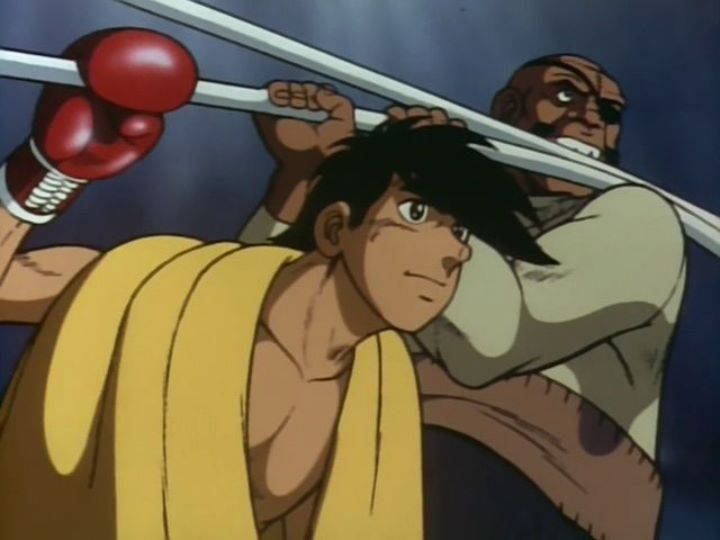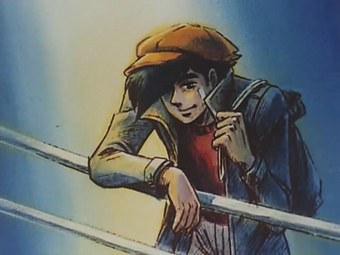






Sometimes, the success of an American property results in inevitable copies in other mediums and countries, some becoming classics of their own. Such is the case with "Rocky," the classic Sylvester Stallone action film about an underdog boxer rising to the top. In Japan, a similar story can be found in "Tomorrow's Joe," also known as "Champion Joe," "Rocky Joe," or by its original name "Ashita no Joe." However, "Rocky" was released in 1976, while the manga for "Ashita no Joe" came out in 1968, with an anime television series in 1970. The boxing craze didn't really take off in American films until after "Rocky"... is it possible it took inspiration to Japan's successful franchise? We may never know for sure.Anyway, the manga is a popular classic in Japan, with a 79-episode anime, a 47-episode sequel, and multiple live-action films, with some adaptations even being made today, 50 years later. Partially due to its length and its age, neither the anime or the manga ever got a proper release in America, and so the property is still relatively unknown to English speakers. The one exception is the "Tomorrow's Joe" movie, recaping the first television series in 1980, mostly produced by reusing footage from the show. It did eventually get released on DVD in 2008 with a full English dub thanks to Tai Seng, a Chinese company, but that release is difficult to get a hold of, and its dub is laughably bad. Discotek came through to release the movie in America on Bluray and DVD, even with that English dub as a fun extra, in 2018, nearly 40 years after its original release. Better late than never, I suppose. And to date, you still can't find the original series, its sequel series, or the film summary of that second series as the sequel to the "Tomorrow's Joe" film in English (although some online streaming services now seem to give it a little attention).Thankfully, "Tomorrow's Joe" holds up fairly well as a stand-alone film, certainly moreso than the many other series-to-film adaptations that exist in anime. It follows "Joe" Yabuki, a young teenager living on the streets, subject to getting into fights and appropriately getting into trouble. He meets a former boxing star named Danpei, now an old homeless drunk, who sees great potential in Joe to become a professional boxer. Joe has no interest at first, and soon lands himself in junvenile prison, but slowly agrees to take Danpei up on his offer to train under him when he sees that proper training could improve his odds against street thugs, and when he meets his first true rival, Rikiishi, in prison. You would think adapting 79-episodes into a single movie would make the story seem incomplete or rushed. On the contrary, the film feels like it takes its time; apparently, the original series was notoriously slow. There are a handful of time-jumps or quick changes in setting that can be jarring, where it isn't certain if events took place over a few days or a few months, but at 2 1/2 hours (one of the longest animated films I've ever seen), it could stand to cut even more out. Or perhaps divide this into two films? I thought I was near the end while watching and was surprised I wasn't half-way through yet. Anyway, the story is surprisingly solid, and its scope and pacing reminds me of grand Hollywood films from the mid-20th century, the ones with large casts, sweeping musical scores, and an "intermission" in between its 3-hour runtime. These types of movies might not appeal to modern audiences like they used to, but there is an undeniable timelessness to them. "Tomorrow's Joe" has that same appeal, and I can agree it earns its title as a classic of Japanese cinema. Joe is a likable bad-boy character, constantly getting into trouble (much to the admiration and respect of young children in the movie) and always cocky about his fighting strength. He gets beat in some pretty dark and grim ways, either on the streets, in prison, or in the ring, but his attitude usually results in a fun turn-around that gives the other side a run for their money. His rival, Rikiishi, is a fascinating nemisis: he isn't mean or evil, in fact is something of a gentle giant with great control of his movement when we first meet him in prison. As much as he hates Joe's arrogance, he still finds mutual respect in him, and both are equally eager to prove themselves better than the other. Before the climatic final fight in the professional ring, we see Rikiishi forcably fasting himself to loose weight to be in the same weight-class as Joe, becoming sickly and most certainly weaker, but still determined and capable to beat anyone. While Joe might be the underdog, Rikiishi's dedication almost makes him appear like the true hero of the story. The mixed feelings you have as a viewer make that final fight all the more engaging, and the tragic ending serves both sides (although the final shot of Joe's cry is almost absurd, ruining the moment). Again, one would think that a film resuing shots from a 1970's television anime wouldn't look great. Yes, "Tomorrow's Joe" is subject to the common issues from pre-digital anime: most shots are still shots with no movement, some shots with mouth movement clips into hands or hair due to improper layering. But the film is still watchable thanks to bold character line work. Most characters are outlined with a style that looks like sketched pencil or chalk, and this makes the fierce intensity and action feel more physical. And those fight scenes, while not comparable to modern choreography, is impressive for the era this was released. The music is like most Japanese films from the time, using a lot of slow Japanese vocal ballads in between musical scores that have legitimate character. I mentioned the English dub is bad, with the wooden emotion and poor lip-sync of a black-and-white martial-arts movie, but it can be fun to listen to if you know what you are getting into (and interestingly, due to editing issues, the music score for the English version is slightly different than the original, making it worth a second watch). I do recommend the original Japanese audio, although it too is also a bit wooden and leaves a lot to be desired.There's a lot of "classic" anime that came before "Akira" and "Ghost in the Shell." Most of it doesn't age well, and frankly doesn't compare to most modern productions, making the effort to return to them only necessary for historians. But there are a handful of franchises that still get talked about, and with good reason. "Tomorrow's Joe" is a definite classic, and while it hasn't aged perfectly, it has done so well enough that I would hand it to you as a confident recommendation.
Again, one would think that a film resuing shots from a 1970's television anime wouldn't look great. Yes, "Tomorrow's Joe" is subject to the common issues from pre-digital anime: most shots are still shots with no movement, some shots with mouth movement clips into hands or hair due to improper layering. But the film is still watchable thanks to bold character line work. Most characters are outlined with a style that looks like sketched pencil or chalk, and this makes the fierce intensity and action feel more physical. And those fight scenes, while not comparable to modern choreography, is impressive for the era this was released. The music is like most Japanese films from the time, using a lot of slow Japanese vocal ballads in between musical scores that have legitimate character. I mentioned the English dub is bad, with the wooden emotion and poor lip-sync of a black-and-white martial-arts movie, but it can be fun to listen to if you know what you are getting into (and interestingly, due to editing issues, the music score for the English version is slightly different than the original, making it worth a second watch). I do recommend the original Japanese audio, although it too is also a bit wooden and leaves a lot to be desired.There's a lot of "classic" anime that came before "Akira" and "Ghost in the Shell." Most of it doesn't age well, and frankly doesn't compare to most modern productions, making the effort to return to them only necessary for historians. But there are a handful of franchises that still get talked about, and with good reason. "Tomorrow's Joe" is a definite classic, and while it hasn't aged perfectly, it has done so well enough that I would hand it to you as a confident recommendation.